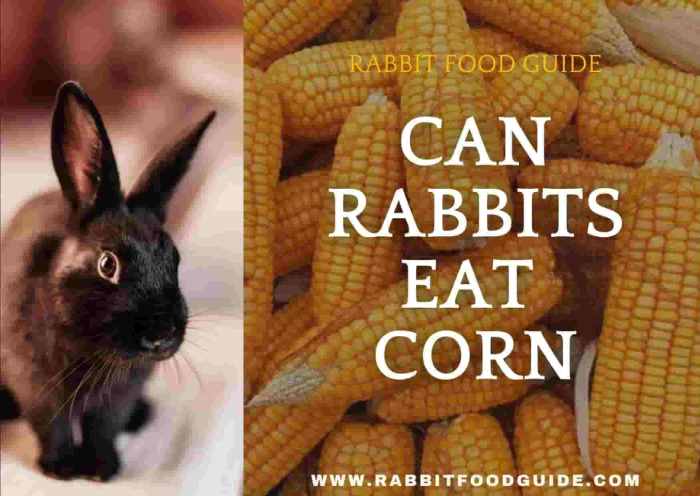Corn is a common food source for many animals, but can rabbits safely enjoy this sweet treat? In this article, we will delve into the nutritional value of corn for rabbits, explore its digestive effects, and provide guidelines for safe consumption.
Additionally, we will discuss alternative sources of carbohydrates to ensure a balanced and healthy diet for your furry friend.
Rabbits are herbivores with a unique digestive system, so it is essential to understand how corn affects their bodies. By exploring the potential benefits and drawbacks of feeding corn to rabbits, we can make informed decisions about their dietary needs.
Nutritional Value of Corn for Rabbits
Corn, a staple crop in many parts of the world, offers a diverse nutritional profile that can benefit rabbits when consumed in moderation. It is primarily composed of carbohydrates, which provide energy, and also contains proteins, fats, vitamins, and minerals.
Carbohydrates
Corn is a rich source of carbohydrates, primarily in the form of starch. Starch is a complex carbohydrate that provides sustained energy to rabbits, helping them maintain their activity levels and overall health.
Proteins
While corn contains proteins, they are not considered a high-quality source. The proteins in corn are low in certain essential amino acids, which are crucial for growth and development in rabbits. Therefore, it is important to supplement corn with other protein sources, such as hay or pellets, to ensure a balanced diet.
Fats
Corn contains a small amount of fats, primarily in the form of unsaturated fats. Unsaturated fats are beneficial for rabbits’ cardiovascular health and can help maintain a healthy coat.
Digestive Effects of Corn on Rabbits

Rabbits possess a unique digestive system adapted to process plant-based diets. Their digestive tract comprises several compartments, including the cecum, which harbors beneficial bacteria responsible for fermenting fiber. Corn, being a starchy grain, can pose digestive challenges for rabbits.Consuming excessive amounts of corn can disrupt the delicate balance of the rabbit’s digestive system.
The high starch content in corn can lead to bloating, a condition characterized by gas accumulation in the digestive tract. Bloating can cause discomfort, abdominal pain, and reduced appetite. Additionally, the fermentation of corn in the cecum can produce excessive gas and toxins, resulting in diarrhea.
Potential Digestive Issues
* Bloating: Excessive corn consumption can lead to gas accumulation in the digestive tract, causing abdominal discomfort and reduced appetite.
Diarrhea
The fermentation of corn in the cecum can produce excessive gas and toxins, resulting in diarrhea.
Safe Consumption of Corn by Rabbits
To ensure the well-being of rabbits, it is crucial to follow appropriate guidelines when incorporating corn into their diet.
Rabbits can safely consume corn in moderation as a treat, but it should not constitute a significant portion of their daily intake. The high starch content in corn can lead to digestive issues if consumed in large quantities.
Appropriate Amount and Frequency
The recommended amount of corn for rabbits is no more than 1-2 tablespoons per week. This small serving size helps prevent digestive upset and weight gain.
Corn should be introduced gradually into a rabbit’s diet to allow their digestive system to adjust. Start with a small amount and observe your rabbit for any adverse reactions.
Monitoring for Adverse Reactions
After introducing corn, monitor your rabbit closely for any signs of digestive distress, such as diarrhea, bloating, or gas. If any adverse reactions occur, discontinue corn feeding and consult a veterinarian.
Rabbits with sensitive digestive systems or underlying health conditions may not tolerate corn well. If you have any concerns, it is always advisable to consult a veterinarian before introducing corn into your rabbit’s diet.
Alternative Sources of Carbohydrates for Rabbits
While corn can be a part of a rabbit’s diet, it is not the only source of carbohydrates available. There are several other healthy and nutritious options that can provide your rabbit with the energy it needs.
Some of the best alternative sources of carbohydrates for rabbits include:
- Hay: Hay is an essential part of a rabbit’s diet and should make up the majority of their food intake. It is a good source of fiber, which is important for maintaining a healthy digestive system. Hay also provides rabbits with essential vitamins and minerals.
- Vegetables: Vegetables are another good source of carbohydrates for rabbits. They are also a good source of vitamins, minerals, and antioxidants. Some of the best vegetables for rabbits include carrots, celery, broccoli, and leafy greens.
- Fruits: Fruits are a good source of carbohydrates, vitamins, and minerals. However, they should be given to rabbits in moderation, as they can be high in sugar.
Summary
In conclusion, while corn can be a occasional treat for rabbits, it is crucial to prioritize hay, vegetables, and fruits as the primary sources of carbohydrates in their diet. By following the guidelines Artikeld in this article and monitoring your rabbit for any adverse reactions, you can ensure a healthy and balanced diet for your beloved pet.
FAQ
Can rabbits eat corn on the cob?
Yes, rabbits can eat corn on the cob, but only in small amounts and occasionally. The cob can be a choking hazard, so ensure it is cut into small pieces.
How often can rabbits eat corn?
Rabbits should only eat corn once or twice a week as a treat. Excessive consumption can lead to digestive issues.
What are the alternatives to corn for rabbits?
Suitable alternatives to corn include hay (timothy, orchard, oat), vegetables (carrots, celery, spinach), and fruits (apples, bananas, blueberries).